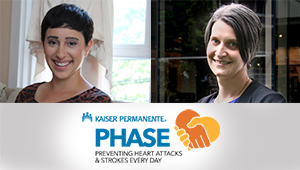- Our Research
- Research Areas
- Addictions
- Aging & Geriatrics
- Behavior Change
- Biostatistics
- Cancer
- Cardiovascular Health
- Child & Adolescent Health
- Chronic Illness Management
- Health Informatics
- Health Services & Economics
- Healthy Communities
- Medication Use & Patient Safety
- Mental Health
- Obesity
- Preventive Medicine
- Social Determinants of Health
- Vaccines & Infectious Diseases | COVID-19
- Our Scientists
- Collaborate with Us
- Our Publications
- Research Funding Sources
- Research Areas
- News and Events
- Get Involved
- About Us
- Live Healthy
All Articles on Chronic Care
- Preventing heart attacks, strokes through health management
How the PHASE program improved care for people at risk of cardiovascular disease.
- Decades in the making: A look back at what makes MacColl, MacColl
MacColl Center co-founder Brian Austin, who is retiring this week, reflects on how the Center became a global pioneer in health care transformation.
- Triple wins for the 2014 Birnbaum Award
Each year at the Birnbaum Lecture, Group Health Research Institute presents the Birnbaum Award to Group Health staff who’ve made extraordinary contributions to the organization’s development as a learning health care system. At the 2014 Lecture, the award will be presented to people involved in three outstanding projects, all funded by Group Health’s Partnership for Innovation.
- At age 20, MacColl Center helps the nation scale up for health reform
The Advanced Primary Care Demonstration Project is helping 500 federally qualified health centers across the U.S. become “level 3 patient-centered medical homes”—in preparation for the uninsured Americans who will seek care in these “safety net” clinics.
- Team care of chronic diseases seems cost-effective
The collaborative TEAMcare program for people with depression and either diabetes, heart disease, or both appears at least to pay for itself, according to a UW Medicine and Group Health Research Institute report in the May 7 Archives of General Psychiatry. Over two years, after accounting for the $1,224 per patient that the program cost, it may save as much as $594 per patient in outpatient costs.
- How does team care improve depression and diabetes?
Treating to target’ and self-care, says Group Health-UW research The growing number of people with multiple physical and mental chronic conditions are among the toughest—and costliest—to care for. The TEAMcare collaborative care program is a promising solution.
- Is combined treatment key?
Most U.S. health care costs go to caring for the 133 million Americans with chronic conditions. Almost half have at least two chronic illnesses. One of those chronic illnesses is often depression, which can hinder a person’s ability to manage everything.
Kaiser Permanente Washington Health Research Institute for:
Kaiser Permanente Washington Health Research Institute
Phone: 206-287-2900Fax: 206-287-2871
Contact us
Sign up for our newsletter
Policy on Conflict of Interest
Nondiscrimination Notice and Language Access Services
Land Acknowledgment
Our Seattle offices sit on the occupied land of the Duwamish and by the shared waters of the Coast Salish people, who have been here thousands of years and remain. Learn about practicing land acknowledgment.





